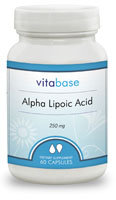Alpha-lipoic acid helps to neutralize the effects of free radicals on the body. Free radicals are waste products the body creates when food is turned into energy. The body can use some free radicals, but too many can reduce immunity needed to fight infection, cancer, and heart disease. Alpha-lipoic acid works together with other antioxidants such as vitamins C and E. It is important for growth, helps to prevent cell damage, and helps the body rid itself of harmful substances.
Alpha-lipoic acid supplements hold promise for treating various disorders, including HIV infection, liver ailments, and glaucoma. Lipoic acid shows evidence of being effective in the treatment of diabetic neuropathy and may be useful in treating some other aspects of diabetes. In addition to functioning as an antioxidant, this hard-working nutrient assists the B vitamins in producing energy from the proteins, carbohydrates, and fats consumed through foods.
Peripheral neuropathy is a type of nerve damage that may result in decreased sensitivity, numbness, and pain, particularly in the lower extremities. Alpha-lipoic acid may help to block such damage. Because of its effect on glucose metabolism, lipoic acid my improve the glucose-lowering action of insulin. In conjunction with other antioxidants, such as vitamin E, alpha-lipoic acid may be doubly helpful in patients with diabetes. Oxidative stress has been implicated in the pathology of diabetic neuropathy, and alpha-lipoic acid is approved for the treatment of diabetic neuropathy in Germany.
Alpha-lipoic acid may improve long-term memory. Because alpha-lipoic acid can pass easily into the brain, it has protective effects on brain and nerve tissue and shows promise as a treatment for stroke and other brain disorders involving free radical damage. As an antioxidant, alpha-lipoic acid holds promise for protecting the body against changes in healthy cells that lead to cancer. The evidence for this cancer-preventive effect is still preliminary, however. Alpha-lipoic acid may benefit anyone whose limbs tend to tingle or become numb, or "fall asleep" due to nerve compression.
Alpha-lipoic acid may prove useful in the treatment of chronic hepatitis because it relieves stress on the liver and helps rid the body of toxins. As an antioxidant, alpha-lipoic acid shields the liver from potentially harmful cell changes and assists it in flushing toxins from the body. This makes it useful in treating such liver disorders as chronic hepatitis and cirrhosis. |
